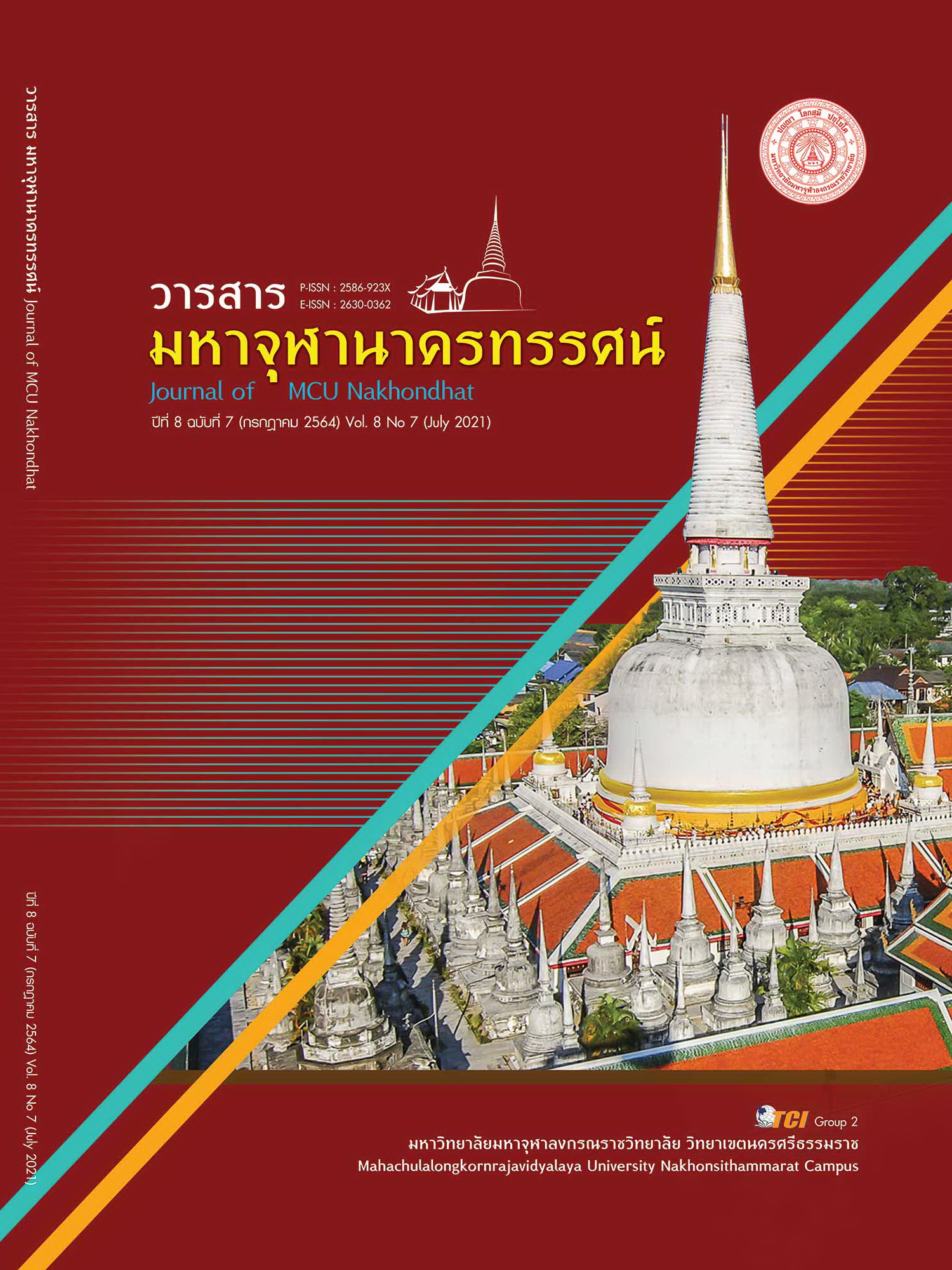LOCAL CONSERVATION INNOVATION: SEARCHING LOCAL HISTORY, CULTURE AND TRADITIONS
Main Article Content
Abstract
This article was as; 1) study the existential culture and the preservation of local traditions. 2) Tourism community program. History, culture, local traditions and 3) Propose a policy and strategy for the conservation of cultural traditions. It is a research in development and applied. By focusing on the participation process of stakeholders, interviewing 30 key informants, by Community development provincial, Cultural office provincial. Tourism and Sports office, Local government organization, Local leader and the public sector. and a group of 10 people, consisting of government agencies. Local government organization Local leader and private networks. sources were analyzed by descriptive content. The research results were found that 1) Identity, culture and conservation of local traditions Politics and governance have the ideals of belief in their leaders. Respect parents, with solidarity and unity of the people in the community, adhering to the principle of leaders to sustain the country being a moral community, leading politics, n terms of culture, there is a way of life based on raw materials that are good in the community. For the center of the community's way of life, the mind has values by being ordained according to tradition. Tradition is creating gratitude through "Rice Culture" Forest ordination tradition Determine the destiny of the river. 2) Tourism Community Program History, culture and local traditions with 3 routes: "Light Green Route", a network of self-sufficiency communities, occupation groups. "Brown Route" Thai way of life travel plan Forest ordination and worship activities for 9 temples, "White Route" travel plans Nawatwithi of Good stuff, Nong Bua District. 3) Policies and strategies for conservation of cultural traditions by using a network of self-sufficiency communities Thai way of life and Nawatwithi of Good stuff, Nong Bua District, Driving community tourism activities promote and develop local tourism agricultural strategy reduce production costs, by bringing local wisdom and natural resources at the local to be adapted for soil conservation solve poverty, reduce disparity developing potential and quality of life of people in the community.
Article Details
References
ณัฏฐินี ทองดี และคณะ. (2557). การจัดการตลาดการท่องเที่ยวโดยชุมชนของแหล่งมรดกทางวัฒนธรรม ลุ่มน้ำโขง ชี มูล ในภาคตะวันออกเฉียงเหนือเพื่อเชื่อมโยง การท่องเที่ยวประเทศไทย ลาว และเวียดนาม. ใน รายงานการวิจัยฉบับสมบูรณ์. สำนักงานกองทุนสนับสนุนการวิจัย.
ดลฤทัย โกวรรธนะกุล และคณะ. (2557). การพัฒนาการท่องเที่ยวเชิงชาติพันธุ์ในลุ่มน้ำโขงบนฐานความเดิมแท้ เพื่อตอบรับแผนการท่องเที่ยวของอาเซียน. ใน รายงานการวิจัย คณะวิทยาการจัดการ. มหาวิทยาลัยขอนแก่น.
ทิพาพร ไตรบรรณ์. (2557). แนวทางการพัฒนาศักยภาพการท่องเที่ยวเชิงประวัติศาสตร์: กรณีศึกษาหมู่บ้านอรัญญิก จังหวัดพระนครศรีอยุธยา. ใน วิทยานิพนธ์ศิลปศาสตรมหาบัณฑิต สาขาวิชาการจัดการอุตสาหกรรมการบริการและการท่องเที่ยว. มหาวิทยาลัยกรุงเทพ.
ไทยรัฐออนไลน์. (2562). OTOP นวัตวิถี' ดึงภูมิปัญญา-วิถีชีวิต เพิ่มรายได้ชุมชนยั่งยืน. เรียกใช้เมื่อ 2 กุมภาพันธ์ 2562 จาก https://www.thairath.co.th /news/local/Bangkok
พงศ์ศานต์ พิทักษ์มหาเกตุ. (2538). ชาวบ้านกับช่องทางประกอบธุรกิจท่องเที่ยว แนวคิดในการจัดตั้งสหกรณ์บริการนำเที่ยวแนวอนุรักษ์แห่งประเทศไทย. กรุงเทพมหานคร: สำนักพิมพ์ปกเกล้า.
พระมหาสุทิตย์ อาภากโร และคณะ. (2552). รูปแบบการพัฒนาแหล่งท่องเที่ยวประเภทวัดในกรุงเทพมหานคร. ใน รายงานวิจัย. สำนักงานกองทุนสนับสนุนการวิจัย.
พิสิฐ เจริญวงศ์. (2550). การจัดการทรัพยากรวัฒนธรรมในงานพัฒนาชุมชน. กรุงเทพมหานคร: โครงการหนังสือโบราณคดีชุมชน.
ไพฑูรย์ ปริญญาธรรมกุล และคณะ. (2564). การปกครองท้องถิ่นรูปแบบพิเศษเทศบาลนครรังสิต จังหวัดตาก. วารสาร มจร สังคมศาสตร์ปริทรรศน์, 10(1), 66-77.
Sukajatanee, P., et al. (2020). The Development of People’s Political Trust Towards Local Politicians in Nonthaburi Province. Journal of MCU Nakhondhat, 7(10), 234-247.


